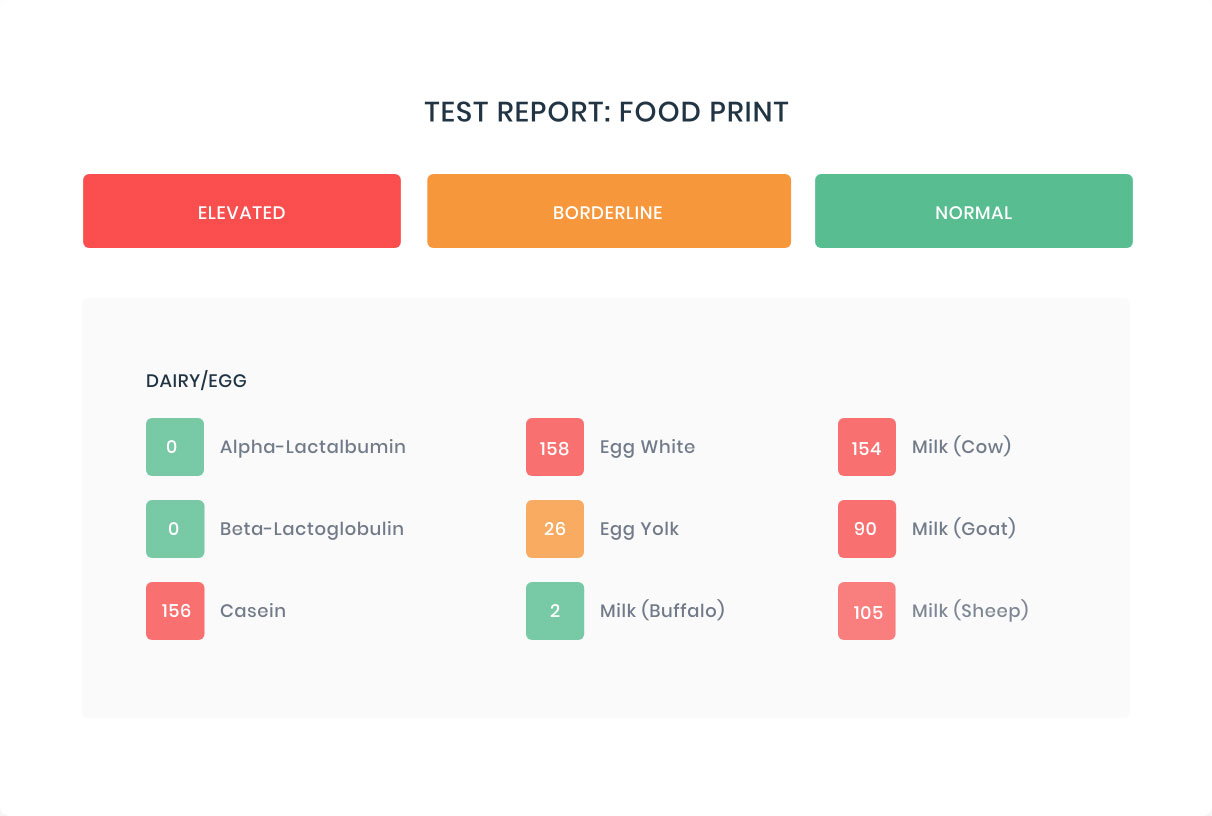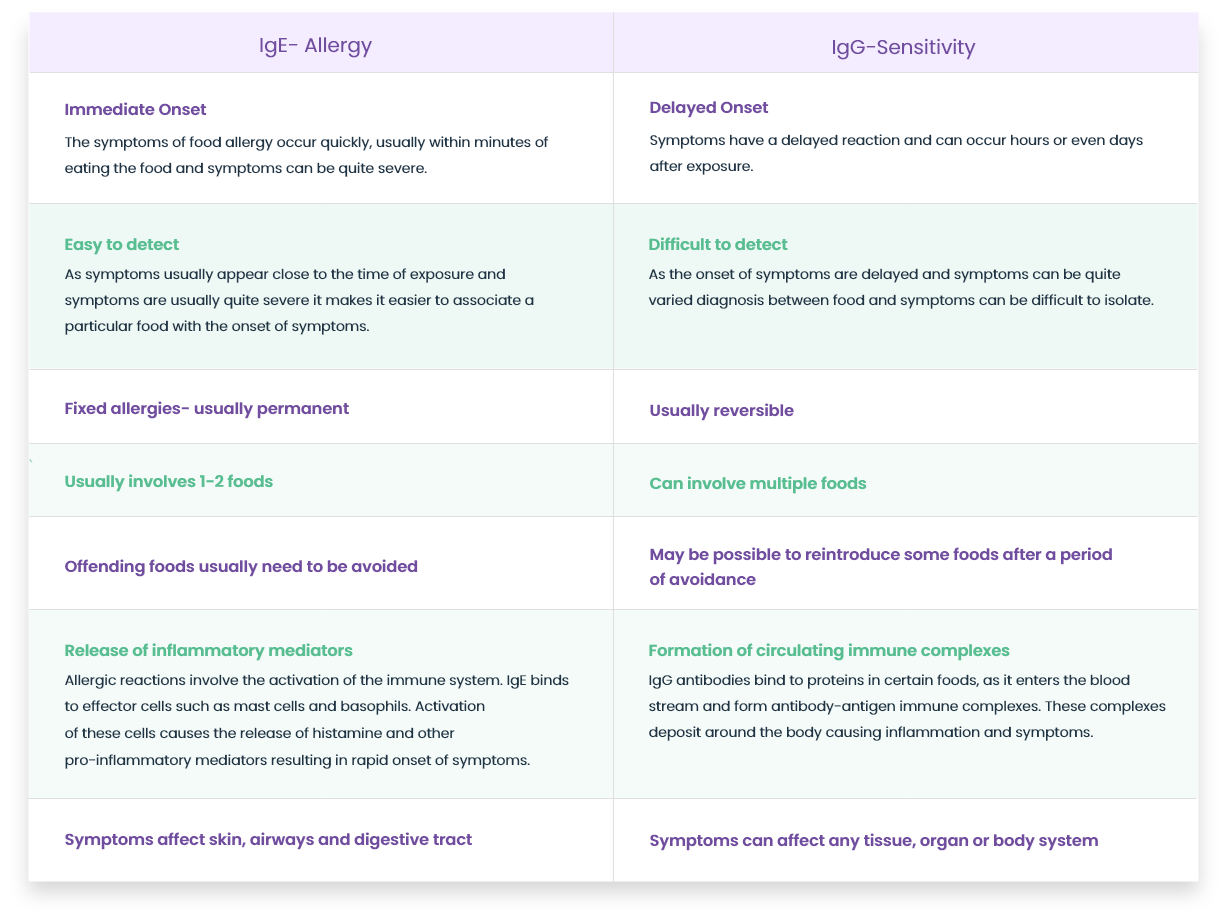Why test for food sensitivities?
The majority of reactions to food are due to food sensitivities rather than food allergies. Although rarely life-threatening, food sensitivities can be the source of many health issues that can affect an individual’s quality of life. Sensitivities to certain foods can develop at any stage in a persons’ life and may affect people differently. Many individuals live with symptoms for years, never suspecting their health issues are a result of sensitivities to the foods they are eating.
Potential food sensitivity reactions:- Headaches
- Migraines
- Sinus issues
- Congestion
- Fatigue
- Hives
- Irritable bowel syndrome (IBS)
- Abdominal ?ramping
- High blood pressure
- Dizziness
- Nausea
Improve your quality
of life
By testing for food sensitivities people are able to identify certain foods that may be causing their health issues. They then have the knowledge to make changes to their diet that can improve or eliminate their health issues and lead to an improved quality of life.
How do food sensitivity
tests work?
Food sensitivity tests measure the antibody levels in your body (immune response) to particular foods. When you eat a food that you are sensitive to your body produces high levels of the antibody known as immunoglobulin G (IgG). These antibodies then combine with the protein in the food you have eaten and form antibody-antigen immune complexes. If your immune system is compromised these complexes will be deposited in organs like your skin, joints, lung-tissue and gastro-intestinal tract. This then results in inflammation and health issues including eczema, skin irritations, arthritis, headaches, asthma, irritable bowel syndrome (IBS) and digestive problems.
Intestinal Labs food sensitivity testing involve taking a sample of blood for analysis. You can visit any of the 900 conveniently located Australian Clinical Labs collection centres to have your blood taken by one of our friendly collectors.
Please ensure there is a Clinical Labs collection centre located close to you before ordering online at clinicallabs.com.au/location
What will food sensitivity test tell me?
-
Eggs & Dairy
-
Fish & Seafood
-
Fruit & Vegetables
-
Grains & Legumes
-
Meat

Once you have completed your selected food sensitivity test and the results have been analysed at our Australian based lab, you will be emailed a comprehensive food report which will highlight any foods you are sensitive to.
The report details the precise antibody level for every food item tested and the higher the level, the more sensitive you are to that specific food.
The report is easy to interpret, highlighting via colour code whether your sensitivity to each food item is ELEVATED, BORDERLINE or NORMAL, helping you identify problem foods that can be avoided. Further explanation is provided in the table below.
ELEVATED
Indicates that a high antibody level was detected
BORDERLINE
Indicates that a moderate antibody level was detected
NORMAL
Indicates that no significant antibody level was detected
What is the difference between food sensitivities and food allergies?
Food sensitivity testing analyses an individual’s immune response to certain foods (specifically immunoglobulin G). It is important to remember that food sensitivities and food allergies are significantly different.


Re-introducing sensitive foods
Here's the good news: having an elevated reaction to certain foods doesn’t mean you have to avoid them for life. Foods you have tested sensitive to can be re-introduced after a period of time. The level of antibodies gradually decline with time reducing the chance of a reaction upon re-introducing the particular food. Foods triggering ELEVATED antibody levels should be eliminated for at least 3 months to allow the body time to clear immune complexes from circulation. Only once symptoms have subsided ELEVATED foods may be re-introduced gradually into your diet.
Please Note: This is a sensitivity test NOT an allergy test.
Select the test that's right for you
There are nine different Food tests available, catering to various dietary variations. This allows you to select a test that contains the foods that you suspect may be triggering your reactions. Utilise the interactive table below to view which foods and food groups are included in each test.
Please Note: Test turnaround times are 10-14 business days.
Kit Added To Cart

Failed transaction
Your order failed due to the following error:

Thank you!
Your order has been submitted! We will endeavour to notify you of your order soon.

Loading, please wait.
This may take up to a minute to process.
Terms and Conditions of Service
It is your responsibility to ensure you carefully follow all steps provided to ensure the health and safety of the couriers, postage workers, specimen reception and laboratory workers.
There is no rebate offered through the Medicare Benefits Scheme for the kits available on the Intestinal Labs shopping cart. Some private health insurance companies may offer rebates, check with your health insurance provider for further details.
If your kit arrives through the mail damaged, contact us immediately for a replacement – do not use or send back this kit.
Intestinal Labs does issue refunds to unused tests for up to 6 months from purchase date, a cancellation fee of $30 applies to all kits. We do not issue refunds for kits purchased over 6 months prior to the refund request.
All kits to be returned are to have the referral form included with the samples. Without this form, there will be no patient allocated to the results and the test will take longer to process.
General Digestive Analysis
Recommended for monitoring treatment, identifying the presence of unfavourable organisms, gut infection, microbial imbalance, malabsorption or assessing whether probiotic supplementation is having a positive impact.
Analysis of your digestive function and gut microbial environment including an evaluation of microscopic and macroscopic markers, such as the presence of fibres, cells and food particles. In-depth analysis of beneficial and pathogenic bacteria including the presence of parasites or yeasts.
Essential Digestive Analysis
Our most popular test – Recommended if you have digestive function issues and require an in-depth analysis of your gut health.
All components of the General Digestive Analysis are included along with additional testing on biochemical markers, such as pH, breakdown and absorption of fats, carbohydrates and protein, pancreatic function and levels of short chain fatty acids (required to maintain normal bowel function).
Comprehensive Digestive Analysis
Select this test for a complete gut assessment and comprehensive parasitology screening.
Our most comprehensive digestive stool test includes all components within the General and Essential Digestive Analysis tests plus a 3-day parasitology test. This increases the probability of identifying parasites as they may not be present in every bowel motion as well as testing for antimicrobial sensitivities (if bacterial organisms are detected).



